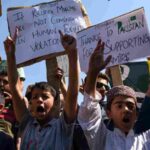This is the latest in The Canary’s series of on-the-ground articles from Venezuela.
If there is a ‘humanitarian crisis’ in Venezuela, the country’s health service should be one of the first places to look for it. The Canary visited a Venezuelan hospital and a CDI – the country’s equivalent of a GP surgery – to observe Venezuela’s health system, and the accuracy of the media’s representation of it.
Venezuela’s health service: truth and lies
Venezuela’s health service has become a site of conflicting narratives about the Venezuelan government and the current state of the country. On 10 March, for instance, Florida senator Marco Rubio falsely claimed that, in the midst of a nationwide electrical blackout, “at least 80 neonatal patients have died at University Hospital in Maracaibo”.
Elsewhere, the New York Times (NYT) wrote that Venezuelan president Nicolás Maduro had “used Cuban doctors to coerce Venezuela voters” by restricting vital medical care. Independent news outlet Venezuelanalysis quickly debunked the latter as an exercise in “pathological deceit”. The NYT report was largely based upon the testimony of three Cuban doctors who had allegedly defected, as well as anonymous Venezuelan sources.
Though riddled with fabrications, these stories receive mass exposure and create an emotionally provocative picture of a country in acute crisis; one that might ‘require humanitarian intervention’. They also consistently lack critical context regarding Venezuela’s economic situation.
Critical context
If Venezuela isn’t currently going through a ‘humanitarian crisis’, the US government seems determined to create one.
For years, the US has been restricting Venezuela’s ability to import vital medicines. In 2017, Citibank reportedly blocked the purchase of 300,000 doses of insulin – medicine which the Venezuelan government had already paid for. And as Mint Press News wrote in 2018:
government sources have denounced the freezing of payments of imported medical supplies such as anti-malaria or HIV treatments. The vast majority of Venezuela’s medical supplies and equipment are imported, and thus vulnerable to blockading policies by foreign agents.
Since 2018, US sanctions have intensified further. This has made it more difficult for Venezuela to import vital medicines, while leaving the government with less money to maintain the health service. Washington’s ‘humanitarian aid’ convoys, moreover, reportedly contained “no medicine” – despite various reports to the contrary within the mainstream media.
In February 2019, US sanctions triggered a major decrease in Venezuelan oil production. As Venezuelanalysis wrote:
The loss of this oil production would be expected to cost Venezuela more than $2.5 billion in oil revenues if it remained unchanged over the next year; however, the decline is expected to get much worse over the year, due to the US sanctions. Total imports of food and medicine last year were about $2.6 billion.
With this in mind, it seems fairly plain that the US has no interest in the integrity of Venezuela’s health service. And as former UN independent expert Alfred de Zayas told The Canary:
To the extent that the sanctions are the direct cause of death – maternal mortality, infant mortality, malnutrition, death through lack of access to medicines, insulin, dialysis equipment, etc. – they constitute a crime against humanity under article 7 of the Statute of the International Criminal Court.
Inside a Venezuelan hospital
On 29 March, The Canary was given access to enter Hospital José María Vargas in Venezuela’s capital, Caracas. Three nights prior, The Canary visited the grounds of the same hospital soon after an electrical blackout. At the time, the hospital’s generator was running and the hospital seemed to be functioning normally.
Inside the hospital, there was no visible “blood, flies, and rotting corpses”, as the Journal emotively wrote of Venezuela’s health system in 2016. Instead, hospital staff were calmly attending to patients, and there seemed to be no shortage of beds. The hospital also had an underground cistern, used to supply water during shortages.
The Canary spoke to both a doctor and one of the hospital’s community directors. They had opposing views about Venezuela’s health service. Between attending to patients, the doctor said:
Fortunately, we’ve had no hunger-related deaths here. However, there are major problems with economic-related health issues: we’ve had people who ate trash, which then causes things like diarrhoea and the serious problems that go along with that. With the lack of medicine, many people also wait for weeks without seeking medical attention – and their health then deteriorates to a critical point.
Asked whether Venezuela was in a state of ‘humanitarian crisis’, the doctor responded bluntly: “yes”.
The local coordinator of Hospital José María Vargas, however, offered a largely different analysis of events. She suggested that many of Venezuela’s doctors come from privileged backgrounds, and are detached from the day-to-day life of poor people in Venezuela. She claimed:
There’s no humanitarian crisis here. We have shortages of medicines but we’re coping – as you can see from the hospital, it’s not like how they’re showing it in the media.
CDI La Prefectura Baruta
CDI La Prefectura Baruta – an equivalent of a GP surgery in the UK – is filled with history. Until 2007, the building was a prison complex; its halls and corridors still bear a certain resemblance to one.
On 21 May 2017, a decade after opening, it was attacked during Venezuela’s notorious ‘guarimba‘ violence (barricade protests). The building was set alight and partially destroyed. Local organisers claim numerous people were hospitalised during the violence. The surgery was then forced to close its doors for 18 months for repairs.
“She hardly slept, she hardly slept, and nor did she”, surgery coordinator Marcelina Hernández said while pointing to community members who volunteered in the aftermath of the attack.
Ornella Belisario, another coordinator, spoke to The Canary about Venezuela’s health system. She began by explaining why the surgery was attacked:
It’s all part of the general sabotage that’s going on in this country. It’s part of damaging what [former president Hugo] Chávez created. In North America, they’re not concerned about our well-being. Like the ‘guarimberos’, they’re trying to sabotage what we’ve created for ourselves: quality health care, free for the people.
As we spoke, Cuban doctors – who were among those attacked during the guarimba violence of 2017 – milled through the hallway.
Belisario continued by talking about the impact of Venezuela’s economic crisis on its health system:
We’re all suffering. There’s no doubt about that. And the economic blockade is largely to blame. We’re not able to import vital medicines. There are many laboratories in Venezuela that have had to close their doors because funds have been withdrawn.
The conversation then moved onto Washington’s record of foreign intervention:
We’re suffering just like Chile in 1973. We have beautiful things and ideas here: free health and education; and a flourishing community. That’s exactly what they want to destroy. Look at Libya, Syria, all those other countries the US destroyed; they want to do that here, too.
Asked whether she considered Venezuela to be suffering a ‘humanitarian crisis’, Belisario said:
I wouldn’t say there’s a humanitarian crisis, no. But that’s exactly what the North Americans want to cause. Remember that humanitarian aid story from February? That wasn’t humanitarian aid; and they found wires and things that could be used to help the guarimbas.
The Canary asked Belisario what she imagines might happen if the main Venezuelan opposition gains power:
Everything we achieved would be destroyed – privatised. In Venezuela’s fourth republic [before the 1999 constitution under Chávez], everything was privatised; we had to pay for everything. They’d order you medicine and you’d have to pay; you were obliged to pay just to survive.
The opposition also wants to negotiate with the IMF [International Monetary Fund]. And when that happens, the game’s over; health, education – everything.
Developed nations?
Criticism of Venezuela’s health system largely comes from journalists based in the world’s ‘developed nations’ like the UK and the US. Medical shortages, however, are not exclusive to ‘underdeveloped nations’ like Venezuela. The Venezuelan doctor’s story about inaccessible medicine wouldn’t be out of place in Washington. As Vox reported on 3 April:
insulin has become so expensive [in the US] that as many as one in four people with diabetes are now skipping lifesaving doses.
Similarly, the UK’s NHS has reportedly been unable to stockpile vital drugs in the case of a no-deal Brexit, meaning “thousands… might die as a result”.
The US and UK – whose own health services are demonstrably underfunded – are using the failings of Venezuela’s health system to justify intervention. But Western elites are likely as indifferent to the suffering of poor Venezuelan people as they are to that of their domestic population.
To this end, Western intervention in Venezuela can be understood within a global assault on the poor. Indeed, if Washington’s neoliberal plan for Venezuela becomes reality, poor people in Venezuela will likely be the worst affected.
Seriously struggling
Venezuela’s health service is, in many respects, seriously struggling. And this article doesn’t claim to paint a comprehensive picture of Venezuela’s health system. It does, however, seek to add balance to the corporate media’s generally alarmist tone while offering critical context about Venezuela’s deteriorating health system.
Anybody remotely concerned about any of this should call for the immediate end of devastating US economic sanctions.
Featured image via author

















